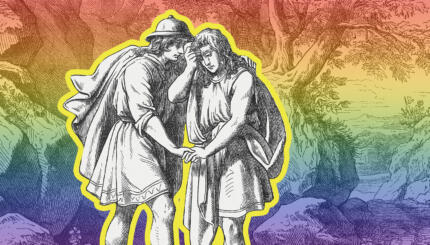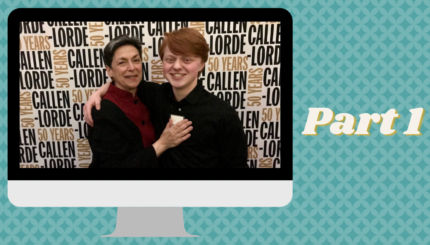Abby Stein grew up in an insular, community in Brooklyn. When she realized she wanted a different kind of life, she contacted Footsteps, an organization that helps formerly ultra-Orthodox Jews integrate into mainstream society. It turns out, that would be only her first transition.
When I decided to leave the religious community where I grew up, it was primarily about religion: ideology and belief.
I didn’t believe in that way of life. I even told myself that once I left, this – whatever it is – is going to go away. Then, when this did not work, I thought that when I got my high school diploma, or when I got to go to college, when I got to date someone, it was going to go away. I tried it all the time, nothing worked. Yet, throughout this whole time I knew what it was, I knew in my heart that unless I could align ‘myself’ with my mind, I would continue to suffer. But I was terrified by the idea, so I chose to ignore it.
From ages 6 to 20 I was convinced that I was crazy because of what I had in my mind. In my mind I had several different ideas on how to become the girl I was. For example, from ages 7 to 9, I read a lot, collecting different articles about organ transplants. I had this idea in my head that I could do a full body transplant. It was the only idea that I had. I didn’t know about gay people then, I certainly didn’t know that anything like transgender people existed. I thought gay people were just something that existed in the Bible, like nephilim.
If only I had known growing up that trans people existed. Nothing might have changed when I was 10, but just hearing someone mention it would have helped me so much.
I didn’t know anything about transgender people until after I got married, when I was 18, and moved into my own home, where I finally got access to the Internet. It was the first thing I looked up online: My first Google search was “boy into girl” or something like that. I had been taught that the Internet was a terrible place to “find out stuff,” so I was happy to be able to “find out stuff.”
For the next three to four years, I read up a lot on the subject. I got to know a lot of trans YouTubers – trans vlogs are an important outlet that trans people use. I read everything that there was to read. Years later, when I finally got to the doctor and he told me what would happen, what was possible and not possible, I was already an expert.
When I joined Footsteps, I started meeting for the first time queer identified people, several of whom became my close friends. Footsteps has always been a place where personal identity and self-determination is not just accepted, but encouraged in the most positive way possible. It was here that I remember thinking for the first time that if I ever transition, I will have support and encouragement. However, at that point I was terrified by the idea of transitioning; even so, knowing that I had a support network was the biggest relief at the time.
It was obvious to a lot of people that I was hiding something, especially the social worker I was talking to a lot in the beginning of my move away from my community. I always got the sense that he suspected something was going on. It’s only recently, when I came out to the Footsteps staff, that one of them said, “Yeah, I knew something more was going on from the moment you joined.”
Last year in school, I struggled a lot. My adviser asked me what was happening and told me that if I wanted to continue, I had to go and see a psychologist. She referred me to a really nice, Jewish therapist at Columbia Psychological Services, and after three sessions the doctor said, “Listen, I will write you the letter and tell your adviser that you’re okay. But you’re hiding something.” I said, “I don’t know what you’re talking about,” but of course I did. In the spring, I went to see a specialist at the LGBT Community Center for the first time, and four sessions in she said, “Listen, you are trans. If you want to continue running from it, go ahead, but in my experience it only gets worse.”
Abby’s story continues in Part Two.
About Footsteps: Footsteps is the only organization in North America that provides comprehensive supports to individuals grappling with the consequences of leaving ultra-Orthodoxy. Through its social, emotional, and practical support services, Footsteps has assisted more than 1,100 men and women define their identities, build communities and lead self-determined lives.
Like this post?


